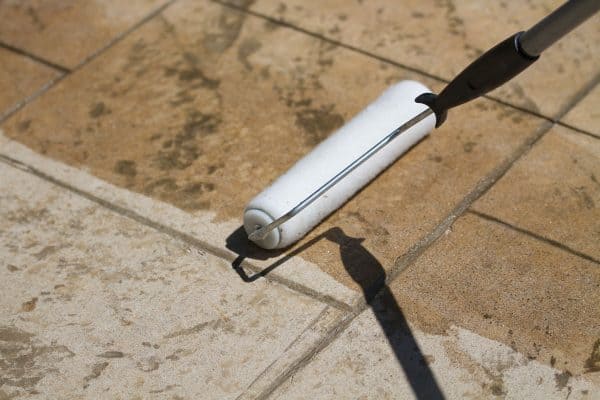Disclosure: We may get commissions for purchases made through links in this post.
Designing your pool deck with pavers is one of the biggest trends in outdoor hardscaping. Since pavers come in different shapes, colors, and designs, it might be difficult making the right choice for your pool deck. To help you choose, we have done thorough research and come up with a list of 10 types of pavers, including their features, pros, and cons.
The following are the most common type of pavers that can add a visually appealing design to your pool deck:
- Granite pavers
- Concrete pavers
- Sandstone pavers
- Bluestone pavers
- Limestone pavers
- Basalt pavers
- Clay pavers
- Travetine pavers
- Brick pavers
- Marble pavers
The pavers you choose for your poolside surface define the pool's design. Picking the right paver is vital for various reasons, from covering slippery floors to adding elegance to your outdoors, so read on to gain in-depth knowledge about the most common type of pavers.
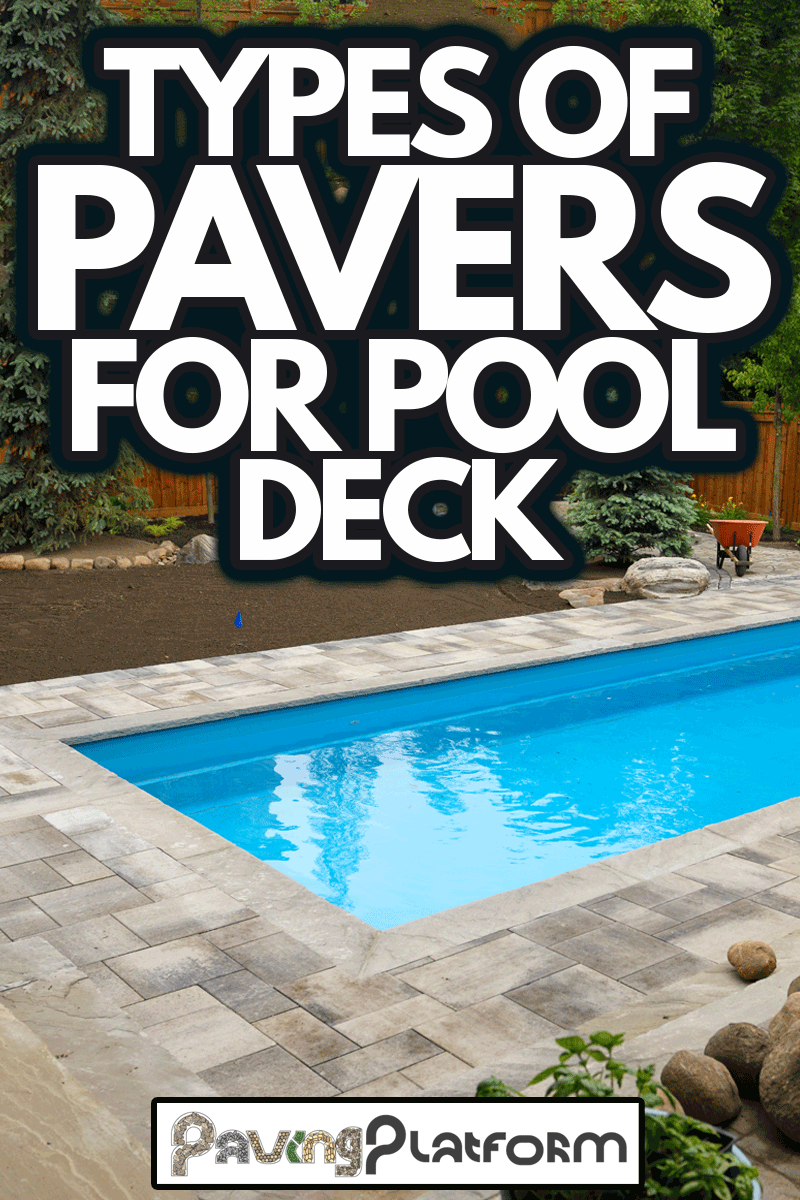
1. Granite Pavers
Granite is mainly used for construction because of its durability and strength. As such, it will be an ideal material for your pool deck. Besides that, granites have a characteristic grainy color and pattern that is suitable for decorative purposes.
It is also irregularly shaped, adding to its anti-slippery property. Another excellent quality of granite is that it is not porous, so you can easily clean liquids spilled on it completely, making it easy to maintain. Due to its sturdy nature, it can withstand heavy loads, giving you fewer worries about cracks and splits.
Lastly, granite pavers are heat resistant and fireproof. There are a few downsides when choosing this type of paver. It can be pricey, especially if you want distinctive colors and patterns.
2. Concrete Pavers
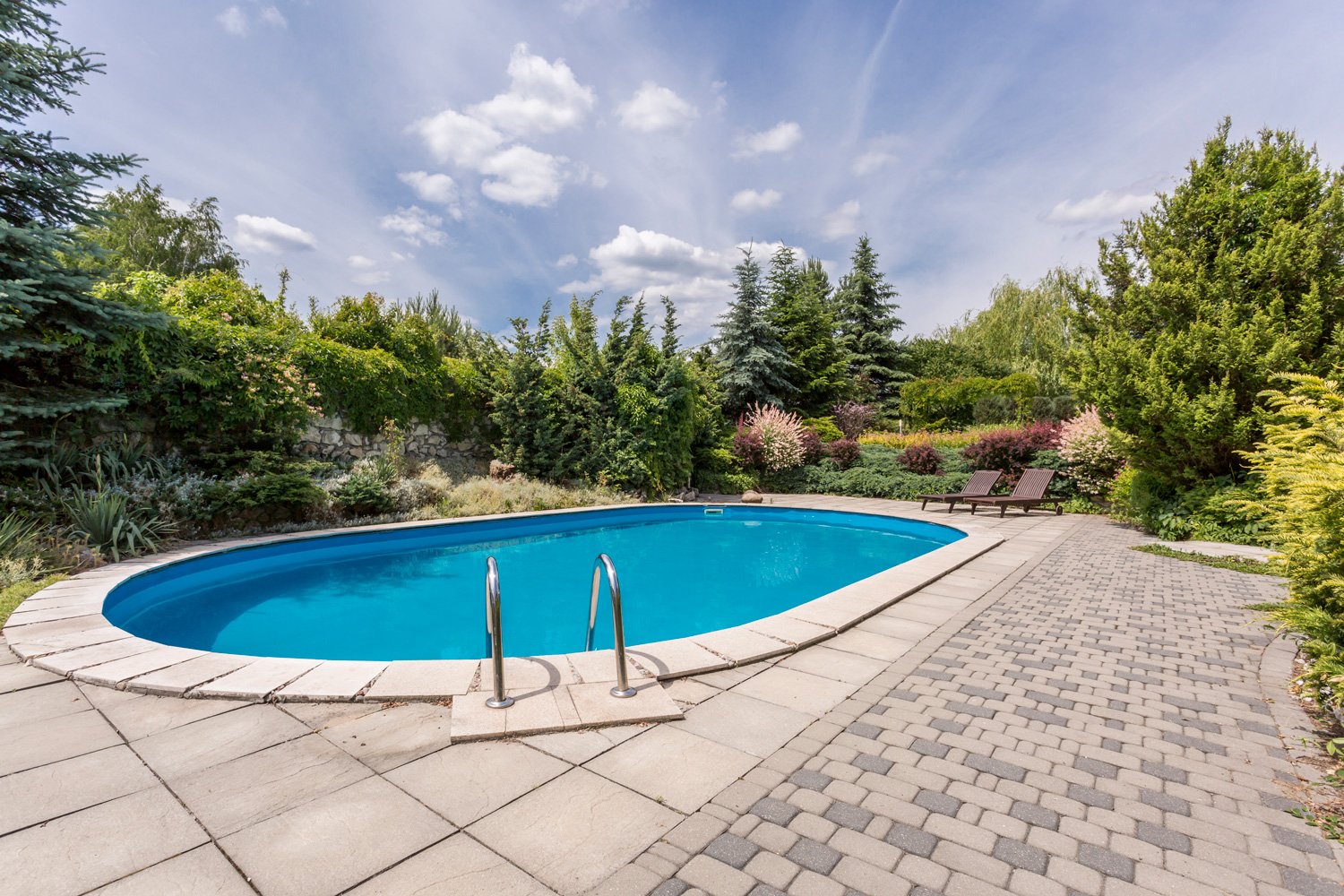
Concrete pavers are primarily made of gravel, cement, sand, and water, but they have different characteristics depending on their construction. There are essentially two types of concrete pavers, interlocking concrete pavers, and architectural concrete pavers.
Interlocking Concrete Pavers
These kinds of concrete pavers contain spaces with interlocking uniform joints. It is made with a very stiff concrete mix and is suitable for a wide range of uses, including paving poolsides and driveways.
Architectural Concrete Pavers
The architectural concrete paver is molded from less strong concrete. It resembles a stone or brick and has no edge spacers or interlinking joints. It is also thin and might not be suitable for certain hardscapes.
Any of the two listed types can be used for your pool deck pavers. Concrete pavers, in general, are solid and durable. They are salt and chlorine-resistant and come in various shapes and sizes.
One of the downsides of concrete pavers is that they require regular maintenance as they are prone to oil stains and the growth of weeds. They can also be slippery when wet: check out this article to know more about the slippery properties of concrete.
3. Sandstone Pavers
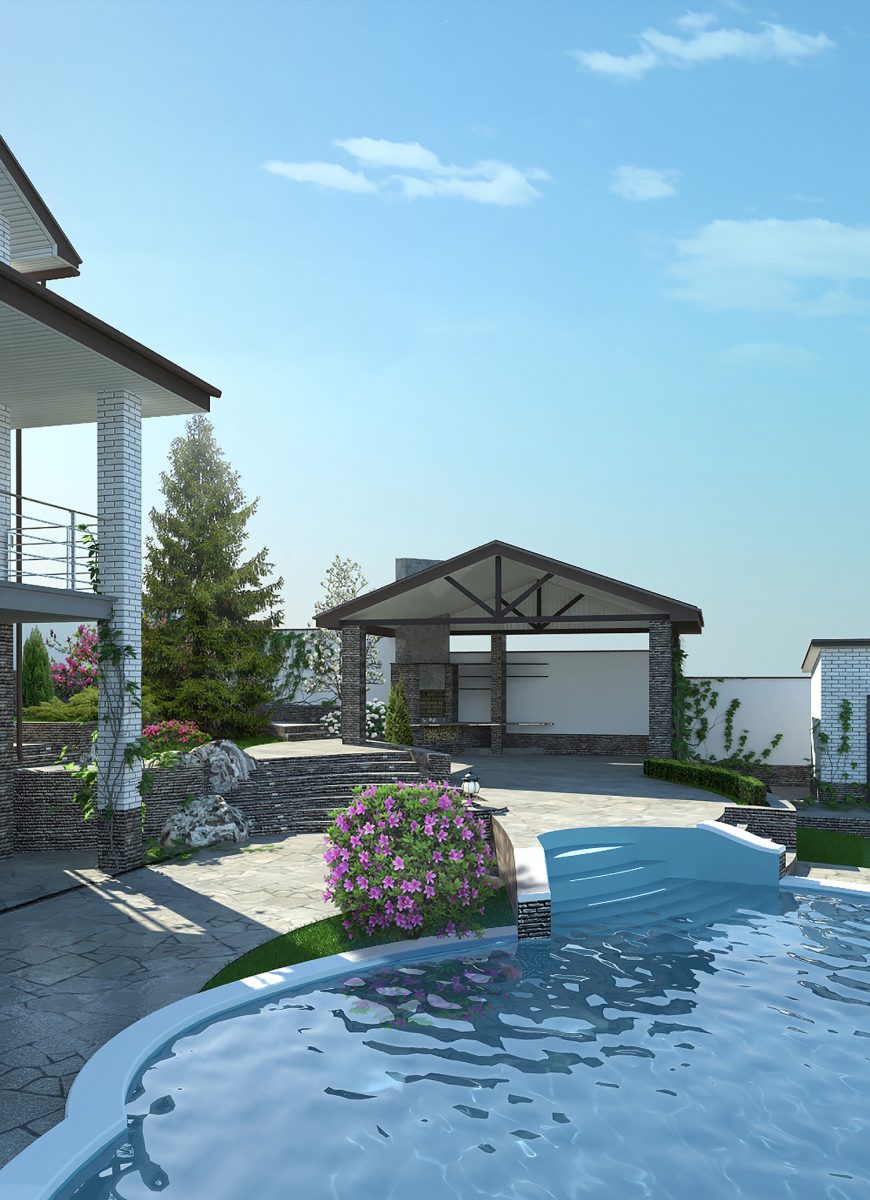
Sandstone pavers are naturally good-looking and slip-resistant. They allow only a tiny amount of stain, so they aren't hard to maintain. Sandstones are durable and tend to handle more weight than concrete pavers and are also heat resistant and feel good on your feet, even on a sunny day.
These pavers are available in various shapes, colors, and sizes. They are easy to install, and broken parts are easily replaceable. Compared to other poolside pavers, the price of sandstone pavers can be on the high side.
4. Bluestone Pavers
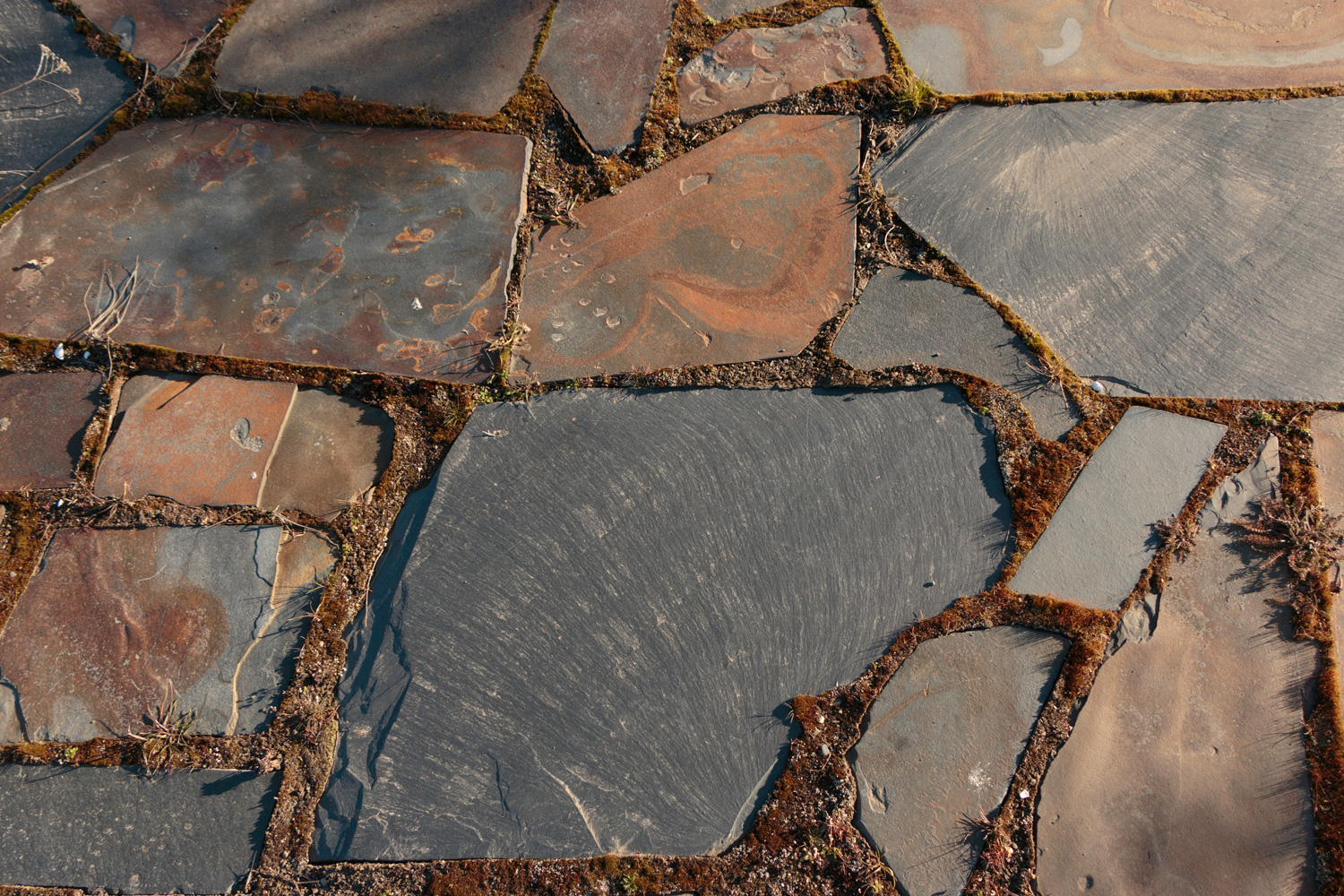
Like sandstone, bluestones are another natural stone used for poolside pavers. They are durable, strong, and come in various shapes and sizes. Bluestones have unique patterns that create a magical mix of colors wherever they are laid.
They are non-slip and water-resistant, making them an ideal choice for your pool deck. Another attractive advantage of using bluestone pavers is that they can withstand all weather conditions and temperatures. However, you will have to seal them to prevent exterior materials such as chlorine from damaging the surface.
A con associated with using bluestone is that the darker the shade, the more heat it absorbs. We recommend reading this remarkable post that covers heat absorption by pavers to learn more.
5. Limestone Pavers
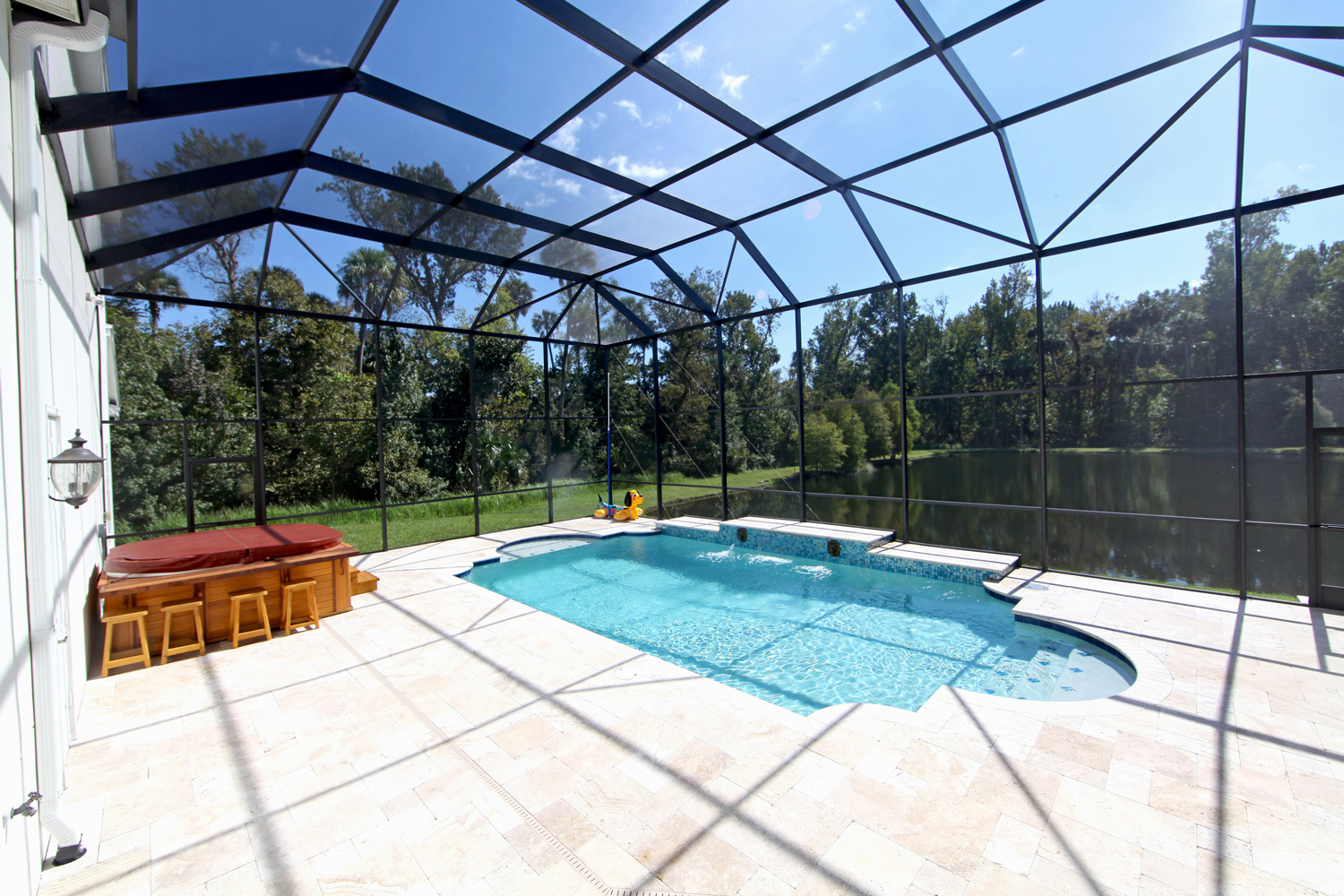
Limestones are sedimentary rocks still within the family of natural stones. These stones are attractive when used in designs and are also slip-resistant, making them an ideal material for your poolside pavers. They are also durable and can last for decades when properly maintained.
Limestones reflect sunlight making them heat resistant. They are also very porous, although there is still a need to add sealers during installation as limestones react quickly to acid from rain and spilled drinks. It stays durable all year no matter the weather conditions, and it doesn't get too hot during the summer.
6. Basalt Pavers
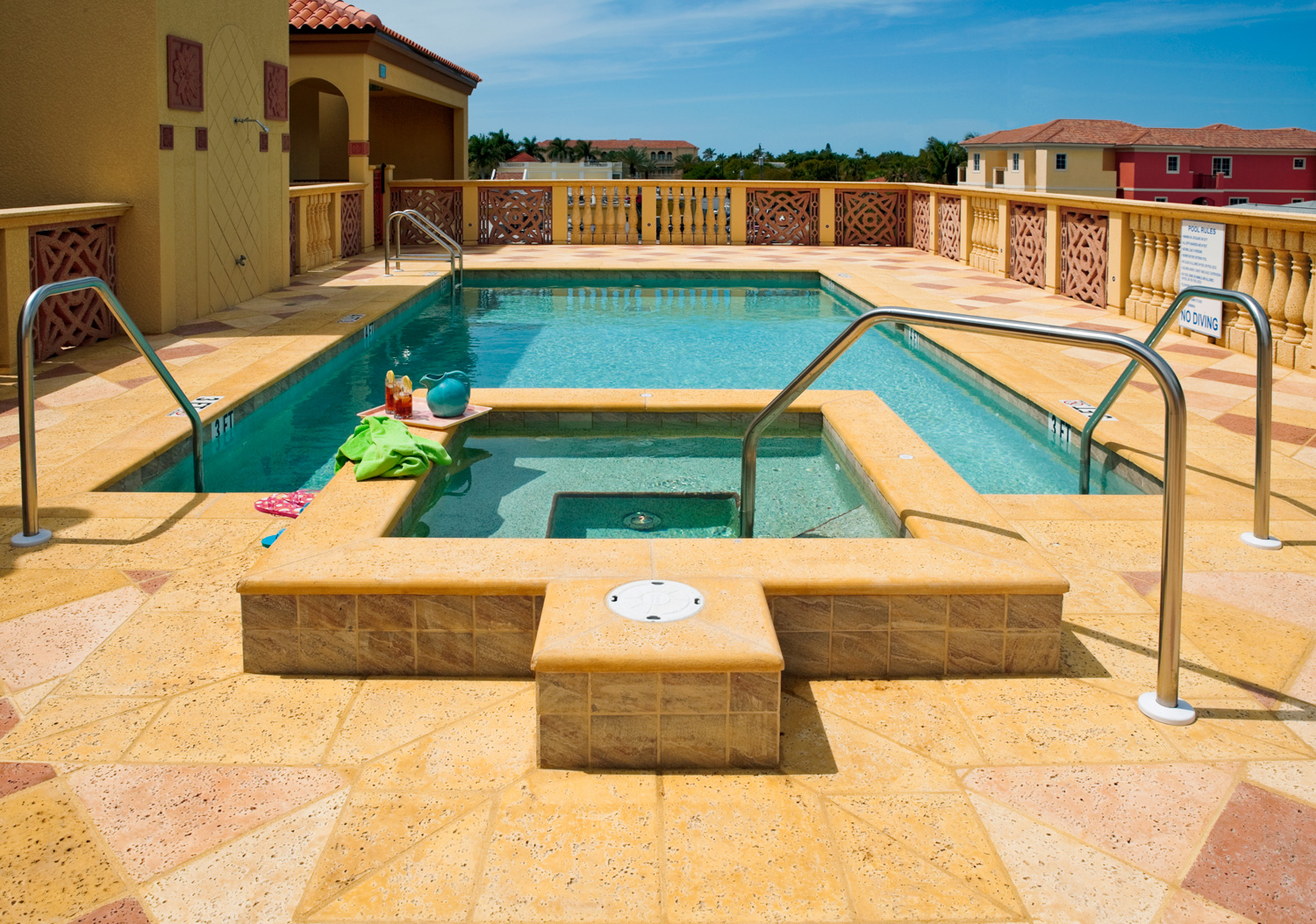
Basalt looks elegant, and using it as a material for your poolside paver will surely add some beauty to it. They are available in different sizes, shapes, and colors for you to choose from. Basalt pavers can also withstand severe weather conditions and maintain their natural form and color.
They are solid and wouldn't break or crack easily. It might be susceptible to stains from oil and food, but a sealant would prevent permanent stains.
7. Clay Pavers
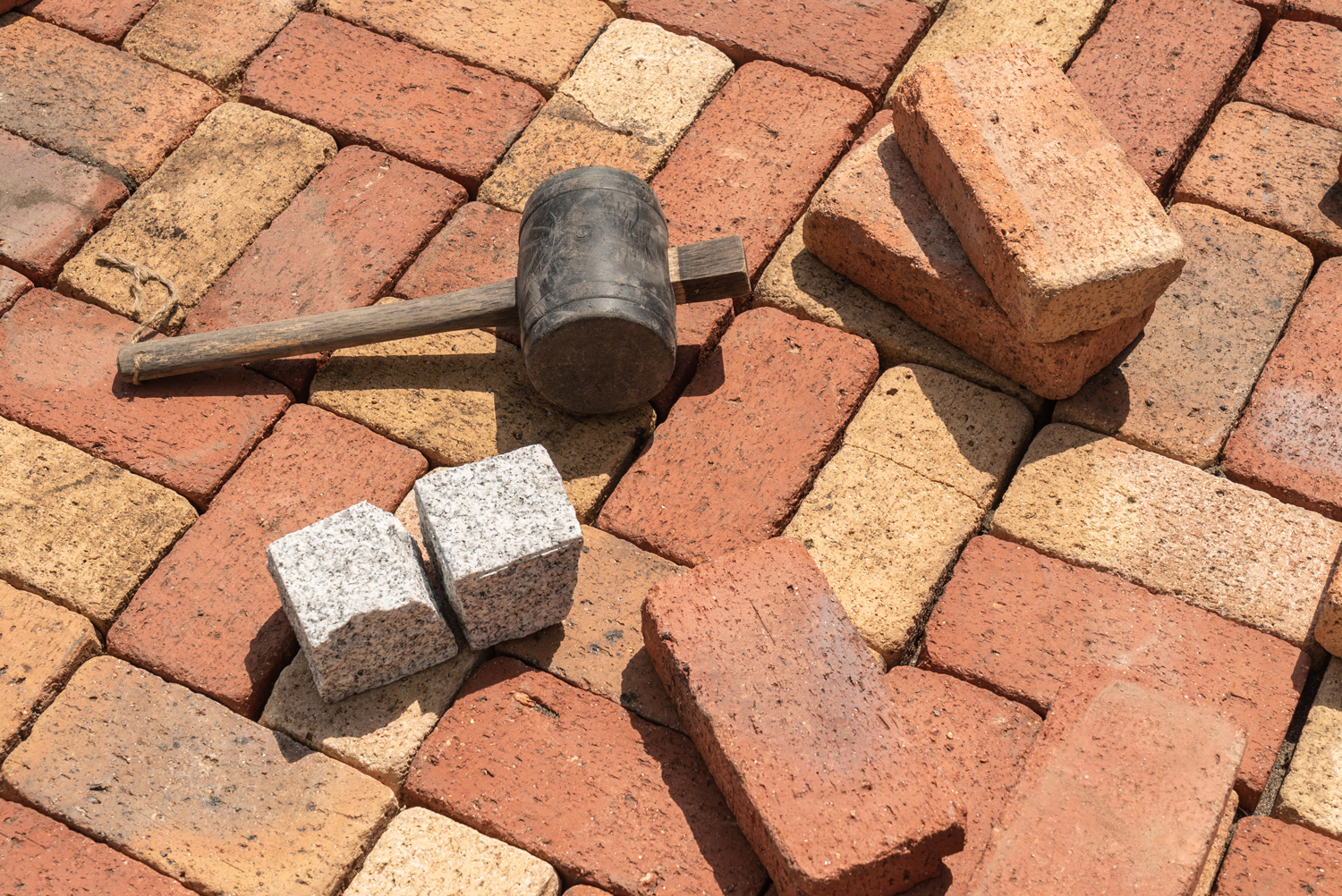
Clay pavers are made by heating clays from the earth using a kiln, giving it a unique color that never fades. This process makes the clay solid and durable, meaning clay pavers can also handle much weight without breaking.
They are mostly installed through interlocking, which distributes their weight evenly. Clay pavers are also easy to maintain and replace due to their simple installation process. They are also less costly than most types of pavers discussed so far.
8. Travertine Pavers
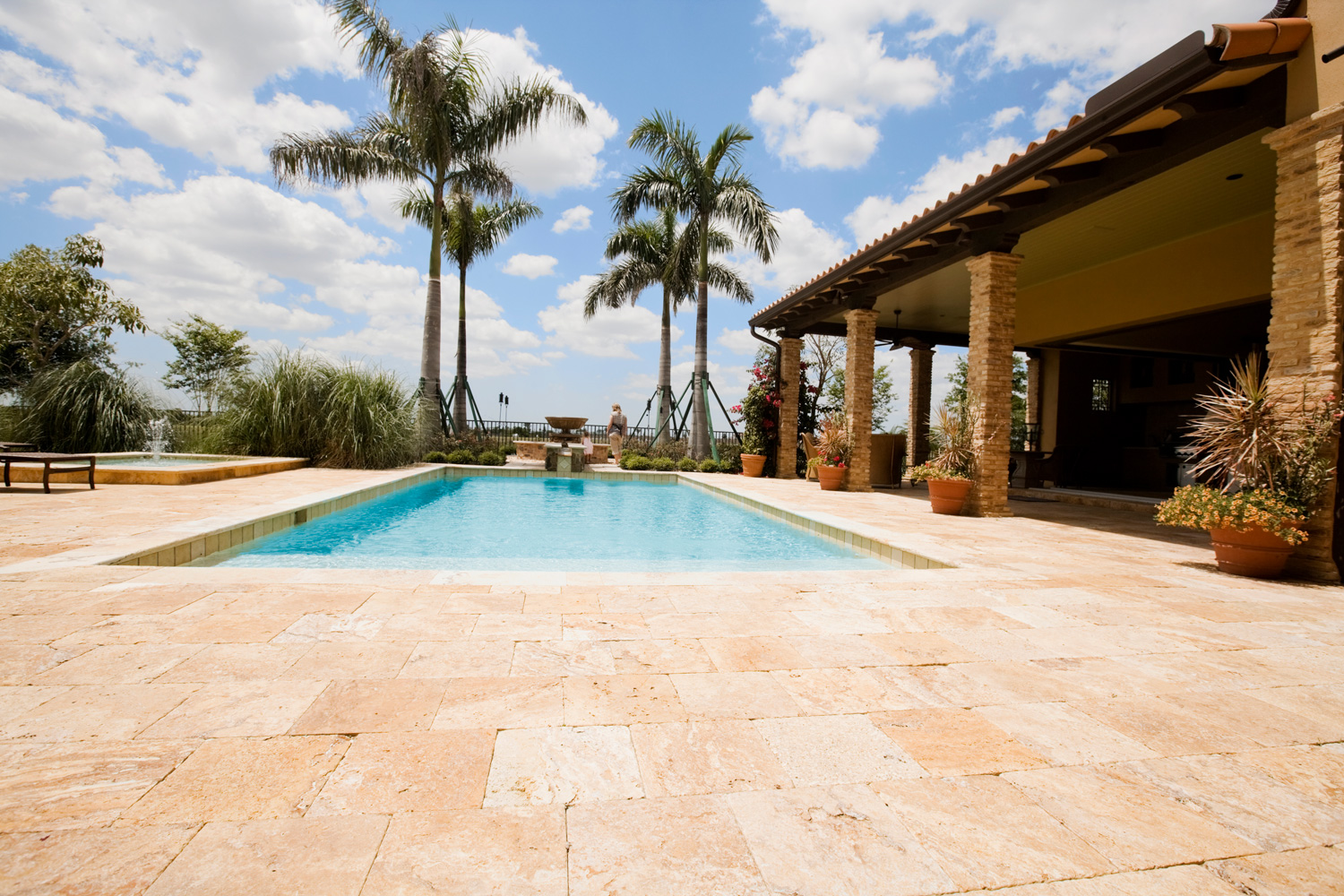
Travertine pavers are very common choices among homeowners. Travertine is a type of limestone with favorable properties that makes it a material you might consider for your pool deck. It is light-colored and porous, making it easy for air to pass through its compartment, preventing overheating. Though an advantage, porosity can also be a downside as water percolates between the pores.
They are heat resistant because they reflect sunlight rather than absorb it. Travertine has unique fissures and patterns, marking every stone with a unique pattern. Despite having all these desirable features, travertine pavers are very pocket-friendly to install. Check out this article about the durability of travertine to know if it is the best choice for your pool deck.
9. Brick Pavers
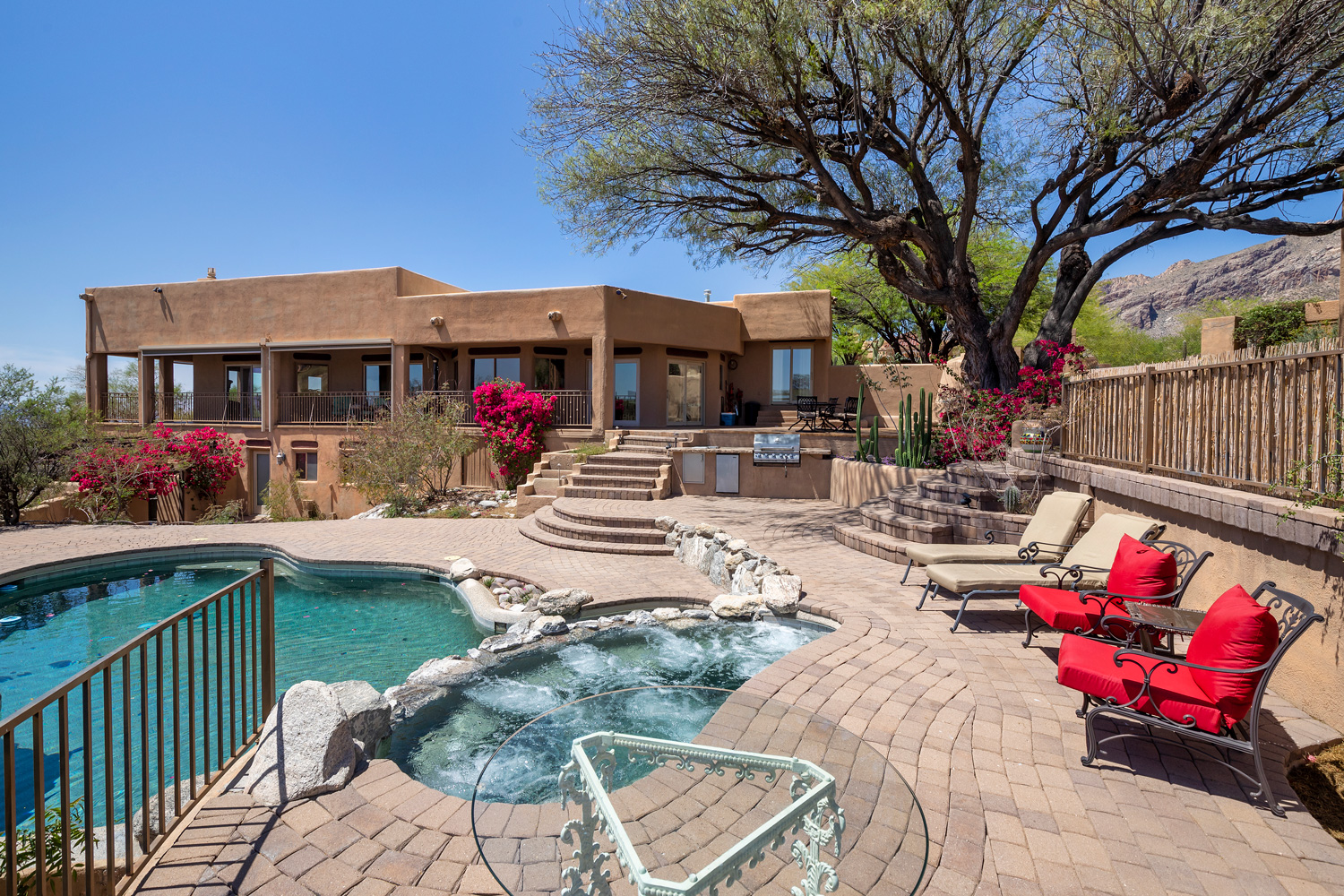
Brick pavers are made from clay through heating after molding. It has been in existence for centuries and is mainly used in building construction. But currently, brick can also be used as pavers for pool decks. The difference between the bricks used for walls and those used for pavers is that the latter is more solid and smooth.
Bricks are man-made and can be shaped into different designs and patterns, although this can make the installation expensive because of the steps and materials involved in molding each brick.
10. Marble Pavers
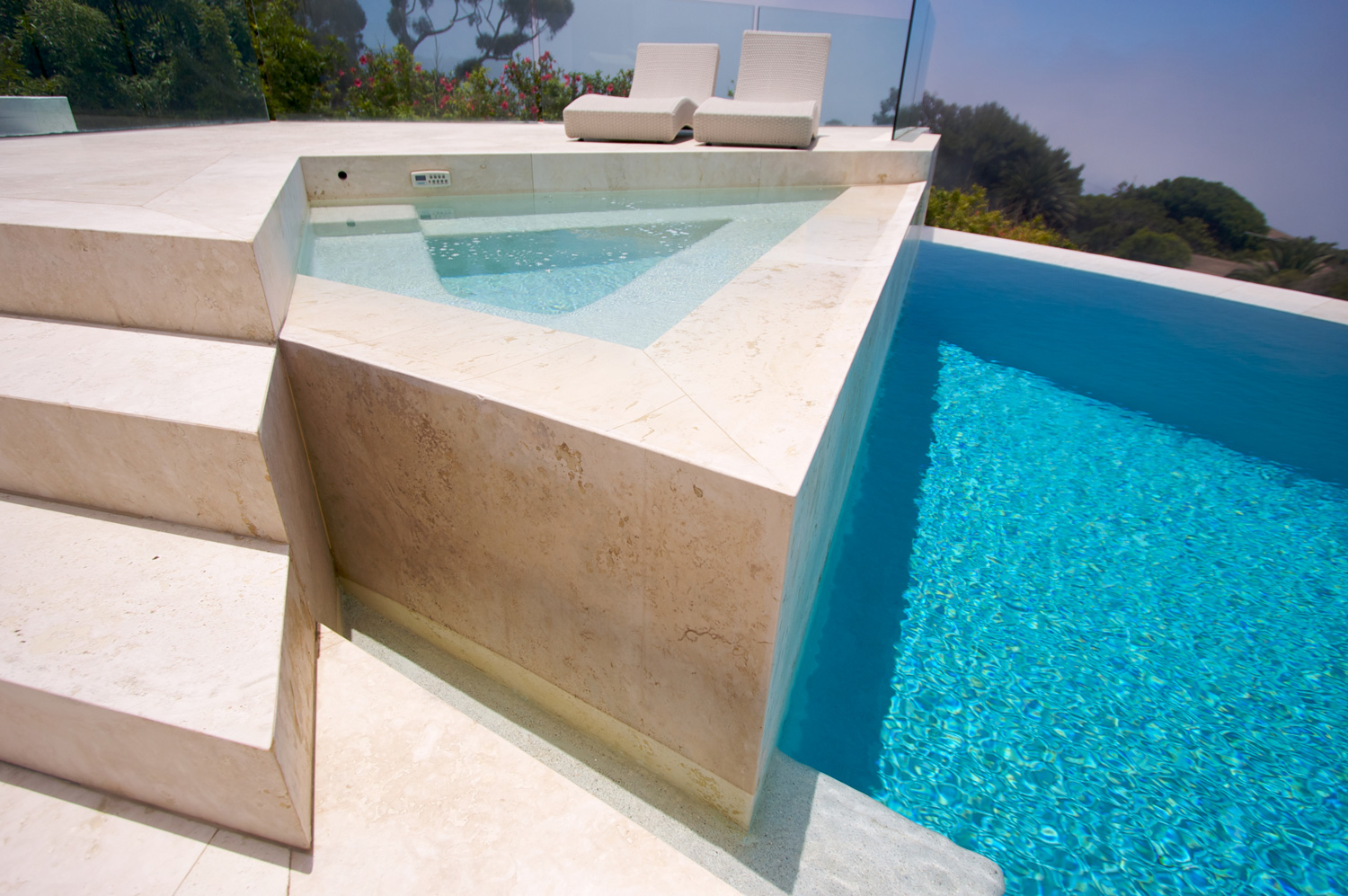
Marble is the strongest and most durable among all the natural stones listed so far. It comes in various colors and provides a more natural-looking pool deck. If you want a sophisticated and expensive-looking poolside, then marble is the right choice for you. There are different types of marbles to choose from carrera white marbles to ice white marbles, and each gives your pool deck a smooth finish.
While marble looks pretty and polished, a disadvantage is that it can get slippery, especially during rainy seasons. This can cause accidents by your poolside and should be avoided if you have children playing around. Using marble might also be a better choice for indoor pools in establishments like spas, as it can be challenging to maintain when used outdoors.
Choosing The Right Paver For Your Pool Deck
Your pool area can look boring without an appealing deck, but choosing the right paver transcends simply buying the shiniest material. Your family and friends would spend a lot of time in this area of your house, so it is essential to consider various factors before making your choice.
Key points to consider include price, durability, ease of maintenance, and heat resistance. There are also extra features you might want to add, like a walkway leading to the tip of the pool or a protective fence to prevent accidents.
In Closing
There is no right or wrong choice when picking the best type of paver for your pool deck. As a homeowner, you might want to prioritize different features based on cost, weather condition of your area, or safety. These are the main pointers that should inform your decision on the best paver for your poolside. Luckily you don't have to break the bank as various options are available for you.

![Vibrant Red Paver Stone Path, Can You Spray Paver Sealer? [How To Apply It]](https://pavingplatform.com/wp-content/uploads/2022/04/Vibrant-Red-Paver-Stone-Path-600x400.jpg)
![Properly laid out red pavers for a garden, Can You Tint Paver Sealer? [And How To]](https://pavingplatform.com/wp-content/uploads/2022/04/Properly-laid-out-red-pavers-for-a-garden-600x400.jpg)
